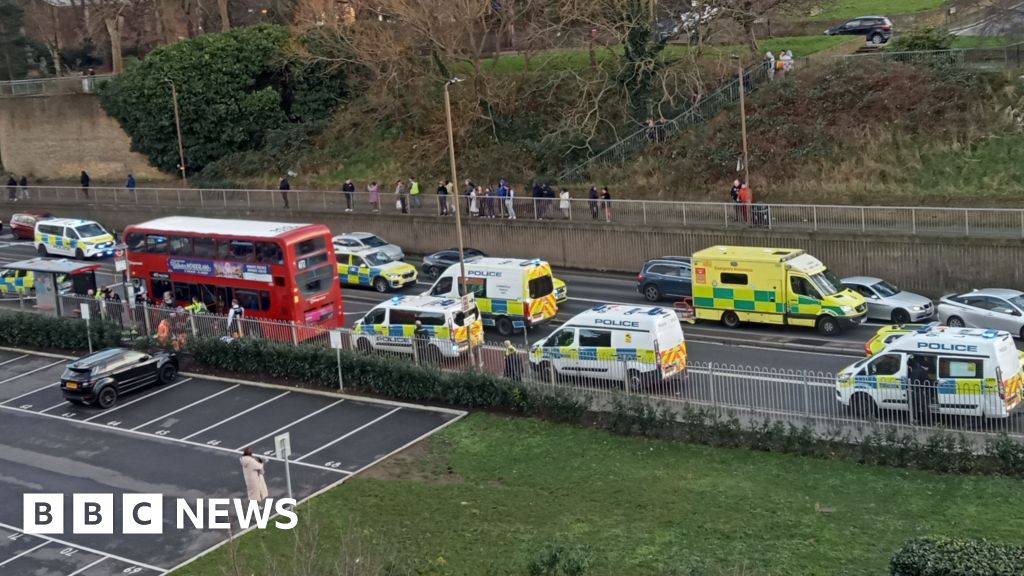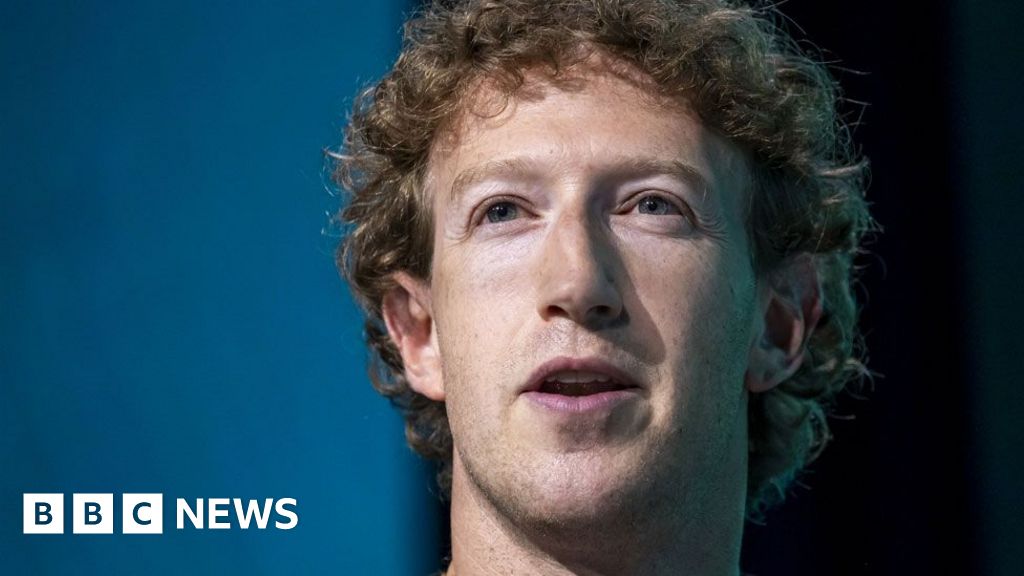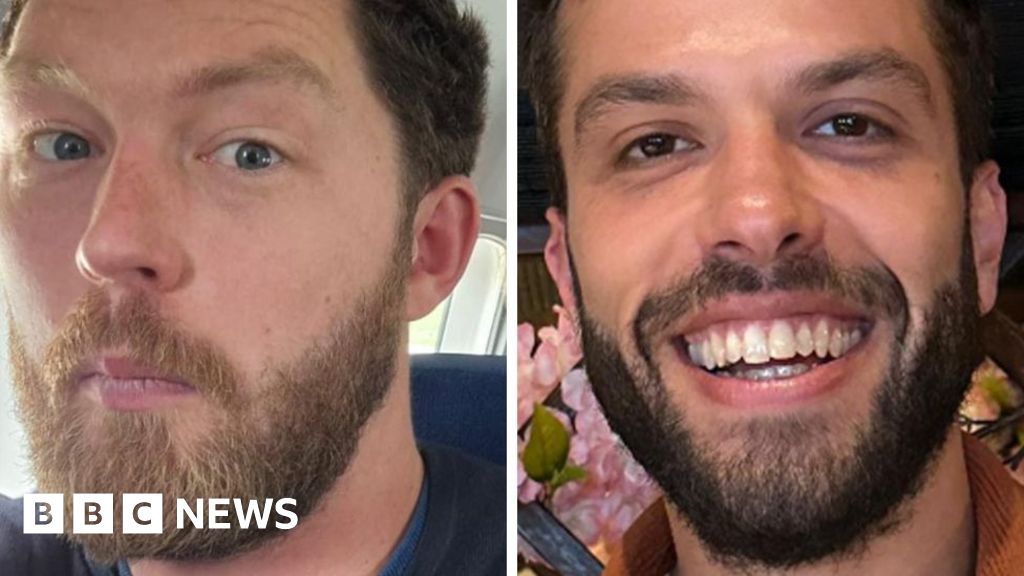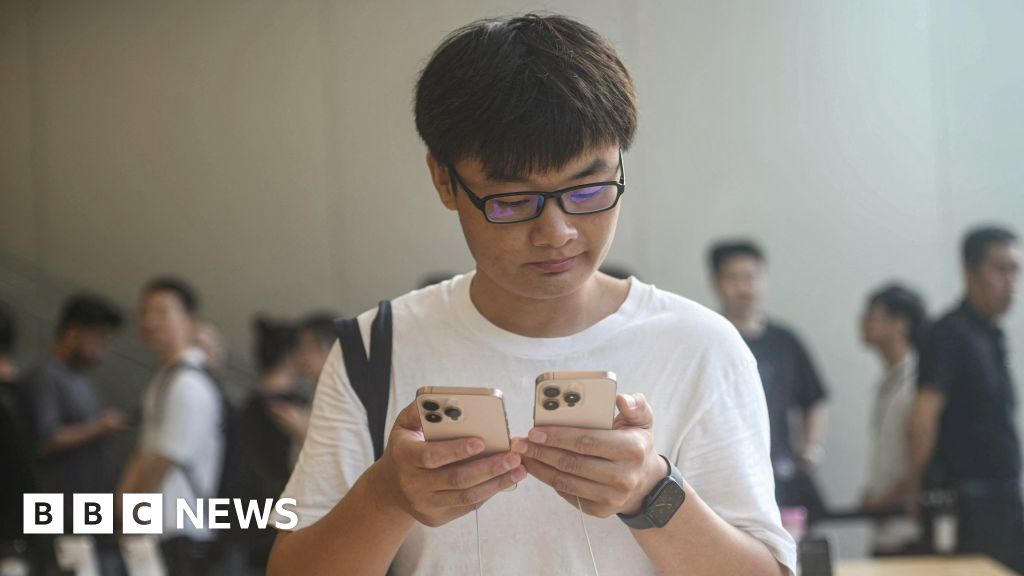
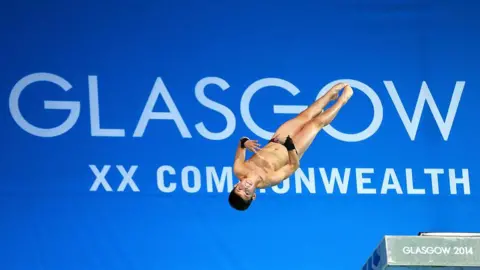 Getty Images
Getty Images
Glasgow is to host the 2026 Commonwealth Games after a deal was backed by the Scottish government.
A scaled-down version of the event, featuring fewer sports and athletes, will return to the city 12 years after it last hosted the Games.
The Australian state of Victoria was originally chosen to stage the multi-sport event but withdrew as host due to rising costs.
Australian authorities have promised "a multi-million pound investment" to help finalise the deal.
Health and Sport Minister Neil Gray held talks with Commonwealth Games Australia on Monday to discuss funding, and received the assurances the Scottish government were looking for.
It has now written to the Commonwealth Games Federation (CGF) to officially back a "a scaled back, but high-quality" event which will see see 10 sports take place across four venues in the city.
The compulsory sports of Athletics and Swimming will be held at Scotstoun Stadium and Tollcross International Swimming Centre but the additional venues, as well as the dates for the event, have not yet been confirmed.
Neil Gray said it would be a "very different Commonwealth Games"
Gray said the fact that the city was asked to step in and host the games was a "testament to Glasgow and Scotland’s fantastic reputation for hosting international events".
He said: "In 2026 all eyes will once again be on Glasgow, and I have every confidence that Scotland’s largest city will provide a fitting platform for some of the world’s top athletes.”
The minister added that CGS would be responsible for the budget and delivery of the event.
He told BBC Scotland News: "If there is a situation where we go beyond a very substantial contingency, CGS will need to look at the way then Games are being delivered rather than calling on either the UK or Scottish government for resource."
He added that he hoped a more "sustainable offering" would allow for a more "diverse mix of countries to host the games in the future".
Scottish Secretary Ian Murray said this was a "positive outcome" for both Glasgow and the Commonwealth Games.
He said: "There are still a few hoops to jump through but I'm very much looking forward to an incredible celebration of sport and seeing Scottish athletes in action in front of a home crowd."
CGF president Chris Jenkins said it would work closely with Commonwealth Games Scotland to formally announce Glasgow as the host city as soon a possible.
He said: "We believe Glasgow 2026 will be an important first step in our commitment to reset and reframe the Commonwealth Games as a co-created, sustainable model that minimises costs, inspires athletes, and excites hosts and International federations."
He confirmed that Commonwealth Games Australia had contributed £2.3m to "enhance the event".
Ian Reid, chairman of Commonwealth Games Scotland (CGS), said he was "delighted" at the confirmation.
He said: “We have been clear from the outset that our Games concept for Glasgow 2026 aligns with the CGF's strategy to make the Games more accessible for future hosts, whilst ensuring that public funds are not required.

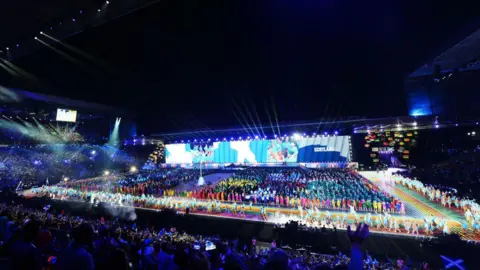 SNS
SNS
The 2014 Games featured a lavish opening ceremony at Celtic Park
Mr Reid added: "Glasgow is one of the few cities in the Commonwealth that can deliver on time given its world-class facilities, experienced workforce and strong supply chain.
“This is a really exciting opportunity and we will be working hard over the coming days to bring the final pieces of the puzzle together."
A final decision was taken at a cabinet meeting on Tuesday morning.
Organisers have stated the Games will come at no cost to the public purse, with funding coming from compensation paid to the CGF after the Australians pulled out.
The UK government will provide financial support in the event of any increased security threat but had refused to completely underwrite the Games.
Gray previously insisted that there was "a reputation risk as well as financial risk" for Scotland in taking on hosting duties again, and that no public funds could be used.
The total budget for the Games is expected to be about £114m.
Scottish Labour leader, Anas Sarwar said: “Glasgow is a great city, but it is in need of economic investment and renewal.
“By hosting the games, we can showcase Glasgow and Scotland on the international stage and bring investment and tourism here.
“This is our chance to complete the legacy of the 2014 games, show global leadership and deliver the change that Glasgow needs."

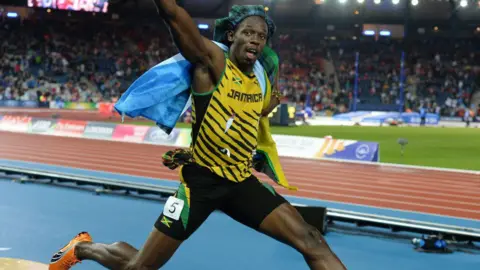 SNS
SNS
Usain Bolt was one of the star attractions in 2014
Sandesh Gulhane, Scottish Conservatives' health spokesman, welcomed the "fantastic news" that is set to be delivered at "no cost to hard-pressed taxpayers".
“This will put Glasgow on the map around the world and is an ideal chance to promote everything that is great about it," he said. "However, I hope by then that the state of our city is much improved compared to how it looks now."
Glasgow last hosted the Games in 2014 at a cost of £543m, with 17 sports taking place in an event praised by organisers as the best ever.
The 2026 version will be a more modest affair, but it it is not yet clear which sports will be cut.
There will be no athlete’s village and any opening and closing ceremonies are expected to be scaled back.
Former Team Scotland athlete and swimmer, Hannah Miley told BBC Scotland News the Commonwealth Games was a "special event" for athletes.
She said: “There were so many great memories from 2014 so to have it again in 2026, I think will be a great opportunity.
“Being able to compete in front of a home nation is something not many athletes get to do. It’s a once-in-a-lifetime opportunity.”
The retired swimmer added that while it was amazing that Glasgow would be hosting the Games again, she had “mixed emotions” that some sports would not be included.
In 2021, the CGF agreed that athletics and swimming would be made compulsory sports, while events such as Archery and Boxing would be made core sports.
It is not yet clear which sports will be excluded from the 2026 Games.

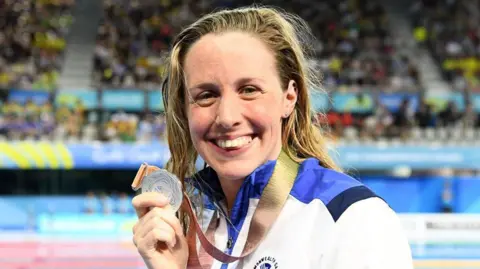 Getty Images
Getty Images
Hannah Miley, who won silver for Team Scotland at Glasgow 2014, said the Games was a special event for athletes
The Commonwealth Games Federation (CGF) has struggled to find hosts for the event in recent years.
Durban was supposed to be the first city in Africa to stage the Games in 2022, but were stripped of hosting rights in 2017 after running into money troubles.
Birmingham and the British government intervened to save the event, stumping up a combined $1bn for what became the best attended Games on record.
Victoria then dropped out in July 2023 after the projected cost for the event became "well and truly too much" for the state to bear, while other possible hosts such as Malaysia and Singapore declined to step in.
The 12-day competition was expected to cost more than A$6 bn (£3.13bn; $4.09bn).
Glasgow City Council leader Susan Aitken said she believed Glasgow could help to make the new Commonwealth Games model a “success”.
Addressing concerns about the condition of Glasgow’s city centre, she told BBC Radio Scotland’s Drivetime programme: “This narrative was in play before the 2014 commonwealth games as well and every single time we have delivered a highly successful event which has had the organisers and the spectators going away delighted and indeed coming back for more.”
Aitken said that significant investment into the city centre, including projects at George Square would not be postponed because of the event.
She added that the CGF would include some investment into Glasgow’s sporting facilities and the council would negotiate for “a bit of an extra boost” to help support cleansing services for the city.
Leon Thompson, executive director of UK Hospitality Scotland, said: "The Games will deliver an economic boost to Glasgow, as well as creating opportunities to promote the city’s attractions over the next few years as it prepares to welcome visitors from across the world."
He added that hospitality businesses would benefit from increased footfall but called on Glasgow City Council to ensure "economic and reputational benefits" were maximised.
 (1).png)
 3 months ago
19
3 months ago
19
